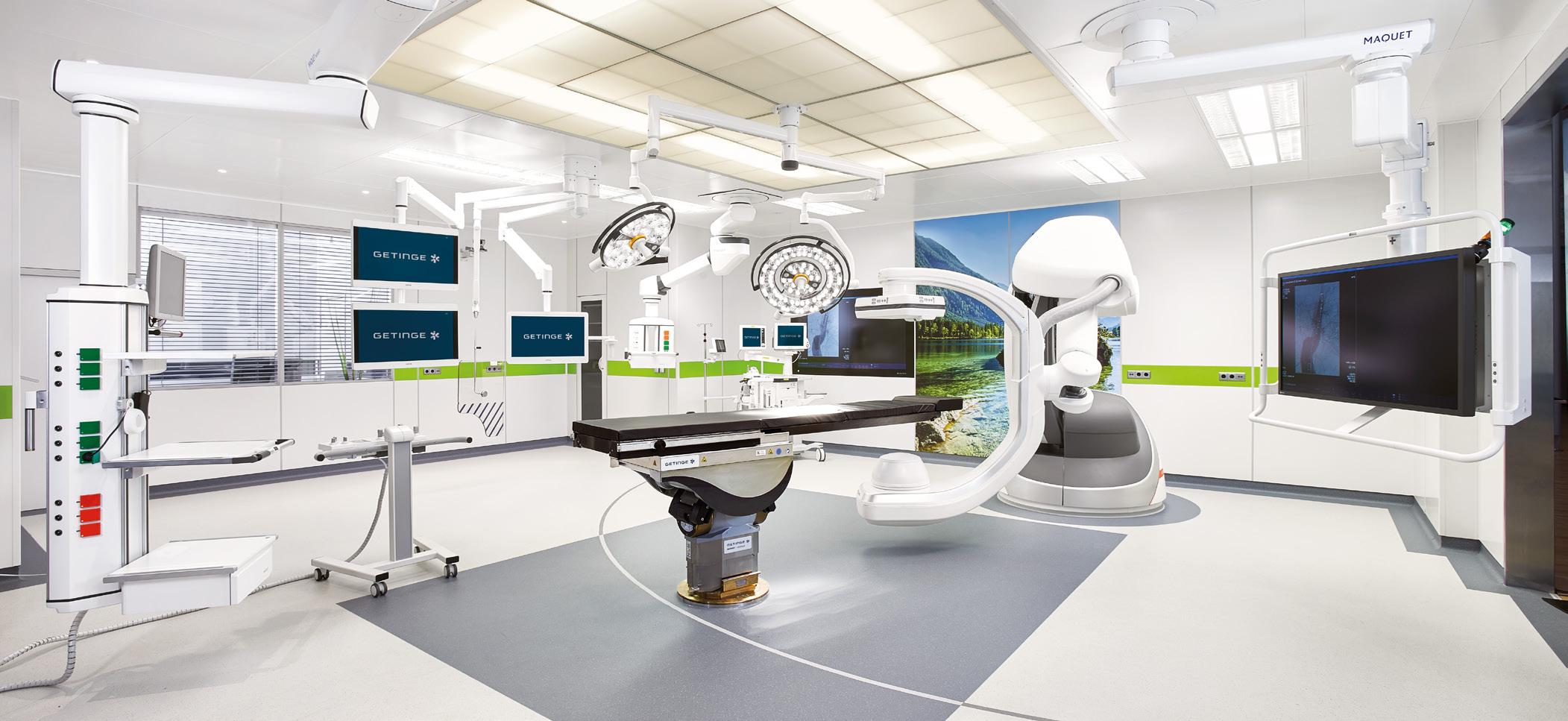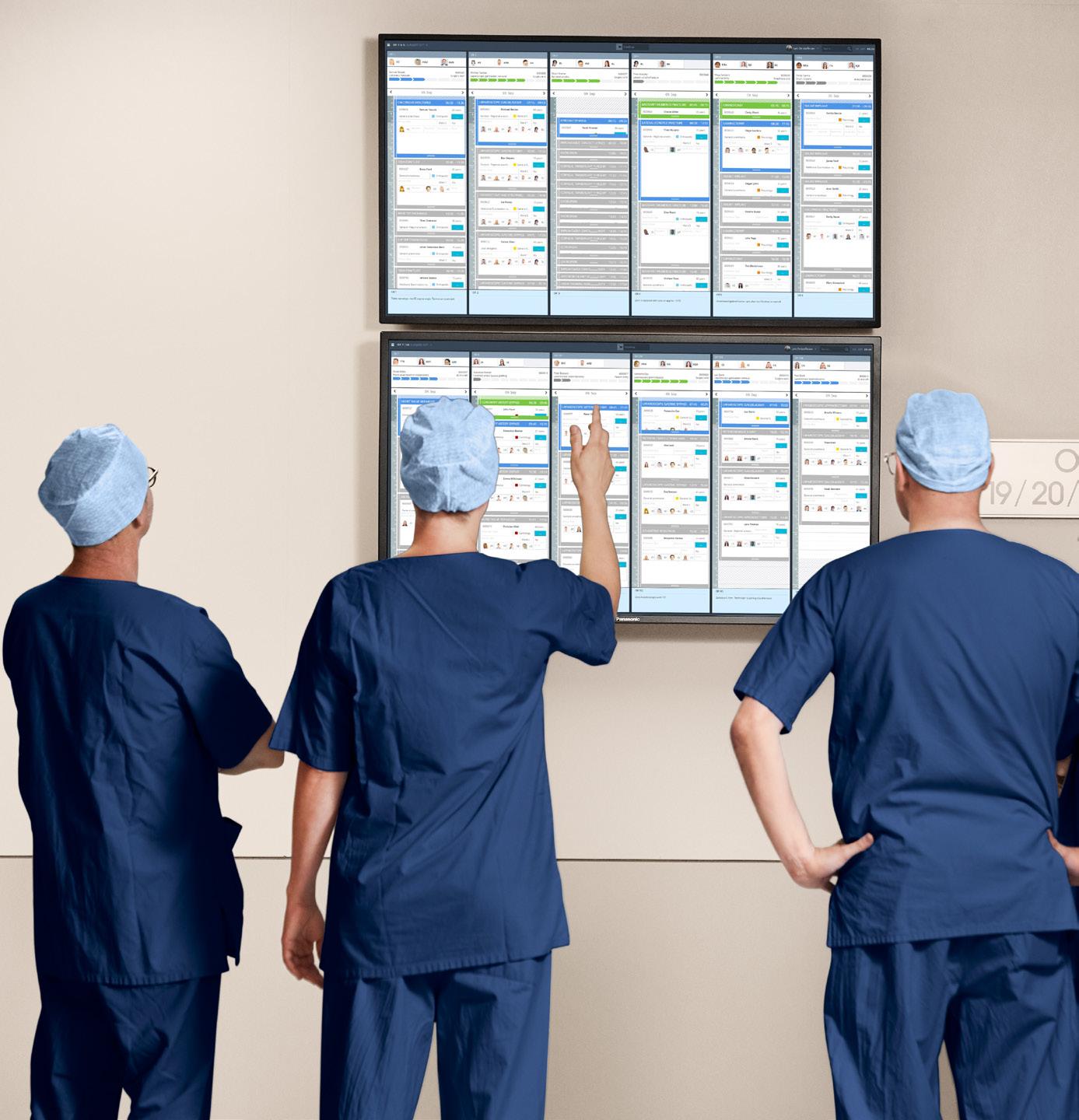
13 minute read
Digital Transformation
from Health Business 22.6
by PSI Media
Digitisation Balancing the need for a digital-first healthcare system with an increasingly ageing and dependent population
Tim Morris, vice president, clinical solutions, Elsevier Health has a look at the pros and cons of digitised healthcare
The UK healthcare system is currently under huge strain. Nearly 20,000 people a day are waiting at least four hours in A&E, while 7.1 million people in England are
waiting for elective hospital treatment, up from 4.4 million before the Covid-19
pandemic. The target time patients should wait for cancer therapy in the UK is 62 days,
however, the total number of people waiting longer than this period has exceeded 69,000 in England, Northern Ireland and Scotland, and doubled
since 2017-2018.
The frontline is facing unprecedented pressure to reduce the number of patients waiting for services whilst significantly understaffed.
Recent analysis of NHS figures shows 4.8 million patients waited more than six weeks for a test or scan from Sept 2021 to Aug 2022, which is a 12-fold
increase on figures before the pandemic. This is coupled with the reality that there
are more than 130,000 vacancies to fill across the NHS, and the effects of this shortfall are exacerbated by the current cost-of-living crisis.
A poll of more than 2000 adults by the UK Council for Psychotherapy and YouGov found that almost one in two feel the cost-of-living crisis is affecting their
mental health. NHS therapy services won’t be able to manage the increased demand driven by the crisis as they are already thousands of therapists short. Moreover, the significant lack of available social care also means many patients who are fit for discharge are unable to leave hospital as they have nowhere else to go. As many as
one in three hospital beds in parts of England are occupied by patients who
are medically fit to leave, but appropriate care services either in patients’ homes, placements in care homes, or
NHS-funded aftercare, are lacking. Increasingly dependent population in the UK In the UK, we are already facing an ageing population with a growing number of people living with long-term chronic conditions. The number of Brits over the age of 85 is predicted to double to 2.6 million in the next 25 years, and as such, the population that is dependent on continuous care will also significantly grow. There is also a growing number of younger patients presenting with comorbidities and obesity-related diseases, Moreover, the significant lack of available social care also means many patients who are fit for discharge are unable to leave hospital as they have nowhere else to go while it is now estimated that a third of middle-aged adults in the UK have at least two chronic health issues. These groups will continue to contribute to the healthcare burden as they age, presenting challenges when planning health and care services. The 2022 Elsevier Health Clinician of the Future report explored global trends and changes that are expected to impact the future of healthcare through a global survey of nearly 3,000 clinicians from 111 countries. The report revealed that clinicians believe the increasingly dependent population is driving change across the global healthcare landscape, with 94 per cent believing the rise of chronic health issues will be a key driver of change in healthcare over the next 10 years. Data also showed that 71 per cent of clinicians agree the increase in comorbidities in younger patients will also play a pivotal role in the changing healthcare landscape. The report suggests a shift to preventive care could potentially reduce the burden of chronic illness and, in the longer term, result in people visiting healthcare facilities less often. However, findings show that 79 per cent of clinicians believe there is currently not enough being done on preventive care, and 84 per cent agreed that patients with ageassociated diseases will make up the majority of the patient population in 10 years’ time.
Digital transformation driving the future of sustainable healthcare The use of digital technology is everincreasing, as clinicians continue to use innovative tools to support interactions and communication with patients. The movement towards more digital appointments, especially in primary care, was accelerated by the pandemic. The Clinician of the Future report highlighted that doctors and nurses believe there is great potential in a digital-first future. Of those surveyed, 70 per cent of clinicians believe the widespread use of digital health technologies will enable the positive transformation of healthcare, in fact, 63 per cent expect most consultations in 10 years’ time will be remote rather than face-to-face.
If digital health technologies are designed with clinicians and patients in mind, wellintegrated, and supported by sufficient training, they have the potential to provide many benefits. Digital technology could save clinicians time spent on administration, enabling them to spend more time with patients, either remotely or face-to-face. Furthermore, using technology to improve processes around patient records and transitions throughout the care pathway could also free up the frontline from maintaining electronic medical records (EMRs).
Considerations for digital-first care A shift to remote may have the potential to empower patients to take on a more active role and become equal partners in the management of their long-term care, however, we must also acknowledge that the evolution to a digital-first will not come without its own challenges. This is also recognised by clinicians themselves. The Clinician of the Future report showed that 69 per cent of clinicians agreed digital health technologies will be a challenging burden, and a further 64 per cent agreed
the impact of health inequalities will be exacerbated by digital tech.
With primary care activities being pushed to online support and teleconsultation, we risk excluding vulnerable and older adults without digital skills from accessing important health information. According
to NHS Digital, it is predicted that by 2030, 4.5m people in the UK, totalling around 8 per cent of the population,
will remain digitally disengaged.
The reality of the shift to digital-first health services has a huge impact on the well-being of vulnerable patients and places challenges on access to care, I’ve had to manage the consequences of this with my own parents. Both my mother and father have physical and social health needs, my mother specifically has respiratory health issues and lives with cataracts and macular degeneration. Though there was adequate online support for respiratory breathing exercises, the ability to assess her condition was significantly more complex when she was unable to travel to the place of care. Further to this, having to book appointments online with impaired vision poses significant challenges.
Digital solutions as the future enabler of clinical care priorities As clinicians continue to face an increasingly dependent patient population, digital transformation has the potential to empower patients to take an active role in their care. This can help reduce the time clinicians spend on administration so they can prioritise those patients that have more complex and continuous needs. It is vital that we ensure digital health technologies should be co-developed with clinicians and patients, to ensure they are fit for purpose.
With a shift to digital-first care, healthcare organisations must support clinicians with sufficient training on new technology and processes so that they are implemented and used to full effect. As a company committed to improving patient outcomes, Elsevier Health will continue to listen to and partner with clinicians, so that we can better understand the challenges they are facing and help to address their evolving needs to best support the dependent population. L
FURTHER INFORMATION
www.elsevier.com/en-gb
Advertisement Feature From product supplier to a trusted partner
Much has happened since Getinge was founded in 1904 in the small town of Getinge, Sweden. Now with operations in 39 countries, sales in more than 125 countries and more than 10,800 employees worldwide, the company has transitioned from selling products to a trusted partner with customer focused solutions that contribute to quality enhancements and cost efficiencies for healthcare systems in the UK, Ireland and the world
“Our solutions are designed to help healthcare providers improve patient outcomes, drive efficiency, and maximise their return on investment,” says Avril Forde, president North Europe and managing director of Getinge UK & Ireland.
Avril continues: “With a global network of experts and 25,000 customers across 120 countries, we can offer our partners valuable insights from all over the world – and our local teams are always ready to help anytime, anywhere, with a deep understanding of the market and the unique needs of each customer’s facilities.”
Getinge has grown considerably, mainly through acquisitions, over the last two decades. In 2000, the acquisition of Maquet enabled the Swedish-based enterprise to start provisioning operating theatres, and the expansion continued with the integration of several companies within OR equipment and critical care. Since 2008, Getinge has also contributed to clinical progress in the field of cardiology with acquisitions such as Datascope and Atrium.
Five years ago, this family of healthcare and life science brands – including Maquet, Lancer, Atrium, Pulsion, Datascope, Steritec, Stericool, Trans and others – were merged into one single Getinge brand.
The recent acquisition of Applikon Biotechnology in 2020 strengthens the offering of advanced bioreactor systems from research to production within the Life Science area.
“We have an extensive brand portfolio with products, solutions and services for intensive care, operating theatres, sterile reprocessing, cardiovascular procedures and life science. Our purpose is as true today as it has always been – we want to empower our customers with the knowledge, expertise, technology and resources to save lives. Our brand promise of ‘Passion for Life’ is not just words, it’s at the heart of everything we do,” says Zah Hussain, director marketing and communications North Europe.
Combining industry-leading solutions into a holistic offering Getinge’s intensive care portfolio includes innovative life-supporting products and solutions for ICUs and intensive care transport that can improve clinicians’ ability to save more lives and reduce long-term complications.
The operating room offering features advanced life-saving therapies and equipment, digital patient management, and the design and implementation of both standard and hybrid operating rooms made to handle a broad range of procedures and patient needs.
Getinge has been working with sterile reprocessing since the early 1930s, and presently the company offers customised and flexible solutions for the complete CSSD, including equipment, consumables and software that can enable hospitals to increase throughput of sterile instruments with the highest level of infection control.
Within cardiovascular surgery, there are solutions for open-heart surgery, advanced monitoring technologies and minimally invasive therapies that help clinicians to conduct successful surgeries as well as to enhance visibility and awareness of patient status.
Finally, the life science business area covers a complete range of sterilisation equipment and transfer systems for pharmaceutical production and medical research institutes, customisable and designed for end-to-end contamination free processes and workflows.
“Our vision is to become the world’s most respected and trusted medtech company, and the ability to combine all our industry-leading

solutions into one holistic offering, which can be individually tailored for the customer, is one of strongest assets,” Zah Hussain explains.
Sustainability and EcoDesign By using EcoDesign principles to design products with special consideration for the environmental impact during their entire lifecycle, Getinge proactively minimizes the use of materials, ensures that products are recyclable and helps customers reduce their consumption of energy, water and other consumables.
“Our sustainability work is an integral part of our passion for life. We are committed to conducting business that is socially, ethically and environmentally sound across the entire value chain. By respecting our customers, employees and the planet in everything we do, we make a positive impact on society, today and in the future,” Zah continues.
Cutting surgical backlogs with digital tools Helping hospitals to catch up with the backlog of surgeries in the aftermath of the COVID-19 pandemic has been an important focus area for Getinge.
Research by the NIHR Global Health Research Unit on Global Surgery shows that 50 million operations globally were cancelled in the first pandemic wave – and that a restart has only been partially successful due to lack of capacity.
In the UK, the NHS has expedited its digitisation plans as a point of necessity throughout the pandemic, with the aim to use additional digital tools in order to realise the full efficiency potential, encouraging staff to work smarter, not harder.
“Our global expertise and significant legacy in operating theatres has enabled us to develop several successful solutions for supporting hospitals in their efforts to reduce the backlog of patients waiting for an operation,” Amy Rothwell, general manager healthcare UK & Ireland says.
Getinge’s Torin OptimalQ and Torin OR Management are designed to help hospitals utilize their surgical capacity in the best possible way.
Torin OptimalQ was launched in the summer of 2020 as a direct result of the acute situation during the pandemic. The service is scalable, easy to deploy, and delivers quick results for staff and patients.
By merging statistics in different areas, such as surgical times and best planning practices, with the customer’s own waiting list data, the tool can calculate the best way to prioritise the surgeries and propose a schedule for the upcoming weeks.
In addition, Getinge’s Patient Flow system INSIGHT gives a hospital complete control over the patient flow from arrival to discharge. It supports the highest standards of care by allowing staff to plan, prioritise and take action to manage patients and beds with a clear overview across the hospital.
As data is shared in real-time, INSIGHT enables better decision-making on all levels, from the individual caregiver to the hospital management.
Both Torin and INSIGHT can be connected with existing systems and deliver a simple and intuitive way of working. These solutions can be implemented separately or deployed in conjunction with each other.
“Successful implementation has been seen across hospitals worldwide and from across all types and sizes of sites. These software solutions can deliver efficiencies and operational improvements across hospital disciplines, which in turn deliver significant savings, improve working environments and ultimately help reduce the NHS elective backlog,” Avril Forde explains.
Partnership is the key to success Getinge’s new technologies and new approaches have demonstrated results, from increased throughput to decreases in average length of stay and reducing non-contact clinical time for staff, all helping to reduce waiting lists and improve patient outcomes.
None of this would have been achievable without the partnership approach, where both the hospital and Getinge work together, sharing best practice, and delivering solutions to agreed common goals.
Flexible commercial solutions, which improve efficiency and productivity while minimizing financial and operational risks are vital components in Getinge’s partnerships with healthcare organizations in the UK and Ireland.
Solutions are designed to meet each hospital’s individual needs, and they come with the flexibility to make changes at any time.
“We guarantee that the chosen solution performs as well on the last day of the contract as on day one. This means that we maintain all equipment to guaranteed availability, so you can plan your work flow with confidence. We also carry out safety-related updates and improvements at no extra cost,” says Getinge’s service programme manager Bob Allen, who has been with company for 20 years.
Bob continues: “As a Getinge partner, all your needs for planning, maintenance and support go through one single source, saving you time and resources. Customers can choose from a variety of preventive service plans and rely on our certified technicians to resolve any issue.”
Education and training Getinge’s education and training solutions bring together healthcare professionals from all over the world, empowering them with advanced clinical and technical programs.
Participants can benefit from technical and operational training, to maximize the use of Getinge equipment. There are also opportunities to gain insights and clinical know-how for implementing new options for improved treatment, including skills needed to operate a new software solution efficiently. L

FURTHER INFORMATION
Getinge UK & Ireland 14-15 Burford Way, Boldon Business Park, Sunderland, Tyne & Wear NE35 9PZ
0191 519 6200 uk.marketing@getinge.com











